As we know in this area without Internet It seems to be like we are nothing. The Internet has become a very essential part of our life. a modem is a device that connects a computer to the Internet. If we talk about modems, There are various types of modems available in the market People use them according to their needs. In this article, we will discuss types of modems and their uses.
A modem is a divide that connects the computer to the Internet, It works as a translator and converts digital signals to the computer into analog signals that can be transmitted over telephone cable wires, etc. In simple language, we can say that without a modem We cannot access the Internet.
List of Types of Modems
| Number | Type of Modem | Transmission Medium | |
|---|---|---|---|
| 1 | Cable Modems | Coaxial Cable | 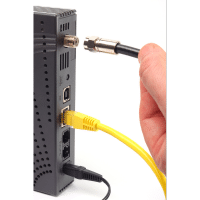 |
| 2 | DSL Modems | Telephone Lines | 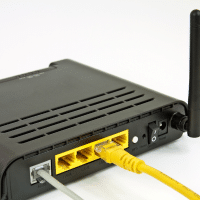 |
| 3 | Fiber Optic Modems | Fiber Optic Cable |  |
| 4 | Satellite Modems | Satellite Dish | 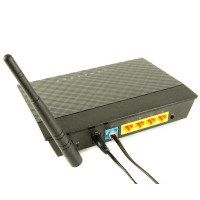 |
| 5 | Cellular Modems | Cellular Network | 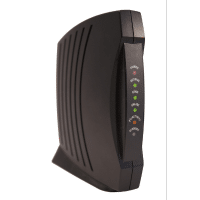 |
| 6 | Dial-Up Modems | Telephone Lines | 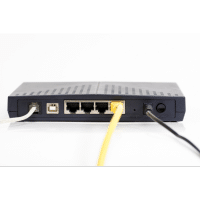 |
| 7 | Wi-Fi Modems | Wireless Connection | 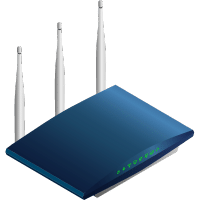 |
1. Cable Modems

Cable modems are used in households. Cable modems are coaxial cables to transmit data. Cable modems are fast and also can provide a reliable Internet connection. It supports multiple devices And is also suitable for heavy Internet use.
Features
- High-speed internet connection
- Suitable for heavy internet usage
- Can support multiple devices
- Relatively affordable
Advantages and Disadvantages
| Advantages | Disadvantages |
|---|---|
| Fast internet speed | Vulnerable to congestion during peak hours |
| Reliable connection | Internet speed can vary depending on the number of users in your area |
| Suitable for heavy internet usage | Availability may be limited in some areas |
| Can support multiple devices |
2. DSL Modems

DSL modems are another types of modem, used for telephone lines to transmit data. It is widely used to provide Internet connections are slower than cable modems but it is suitable for light Internet uses
Features
- Suitable for light internet usage
- Available in most areas
- Provides a reliable internet connection
Advantages and Disadvantages
| Advantages | Disadvantages |
|---|---|
| Widely available in most areas | Slower internet speed compared to cable modems |
| Relatively affordable | Not suitable for heavy internet usage |
| Provides a reliable internet connection |
3. Fiber Optic Modems

Fibre optic modems are fiber optic cables that are used to transmit data. These modems are the fastest modems available in the market which provide reliable Internet connection. Fibre optic modems are highly Internet usage and also can support multiple devices.
Features
- Fastest internet speed
- Suitable for heavy internet usage
- Can support multiple devices
Advantages and Disadvantages
| Advantages | Disadvantages |
|---|---|
| Fastest internet speed | Expensive compared to other modems |
| Reliable connection | Availability may be limited in some areas |
| Suitable for heavy internet usage | |
| Can support multiple devices |
4. Satellite Modems

Satellite modems are another types of modem, used to satellite these to transmit data. These modems are suitable for those areas where cable or DSL Internet is not available. Satellite modems are slower than cable or fiber optic modems. Probably these are not suitable for heavy Internet use.
Features
- Suitable for areas where cable or DSL internet is not available
- Provides a reliable internet connection
Advantages and Disadvantages
| Advantages | Disadvantages |
|---|---|
| Suitable for areas where cable or DSL internet is not available | Slower internet speed compared to cable or fiber optic modems |
| Provides a reliable internet connection | Not suitable for heavy internet usage |
| Can support multiple devices | Expensive |
5. Cellular Modems

Cellular modems are another types of modem, used in a cellular network to transmit data. These are suitable for those areas where cable or DSL Internet is not available. Cellular modems are slower than cable or fabric modems. So these are not suitable for heavy Internet.
Features
- Suitable for areas where cable or DSL internet is not available
- Provides a reliable internet connection
Advantages and Disadvantages
| Advantages | Disadvantages |
|---|---|
| Suitable for areas where cable or DSL internet is not available | Slower internet speed compared to cable or fiber optic modems |
| Provides a reliable internet connection | Not suitable for heavy internet usage |
| Can be expensive |
6. Dial-Up Modems

Dial-up modems are another types of modem used to telephone lines to transmit data. These were commonly used in previous eras. these are outdated modems. Dial-up modems are slow and are not suitable for modern internet usage.
Features
- Outdated technology
- Slow internet speed
Advantages and Disadvantages
| Advantages | Disadvantages |
|---|---|
| Affordable | Outdated technology |
| Slow internet speed | |
| Not suitable for modern internet usage |
7. Wi-Fi Modems

Wi-Fi modems are another types of modem, use a wireless connection to transmit data. These are suitable for households with multiple devices and provide a reliable internet connection.
Features
- Provides a wireless internet connection
- Suitable for households with multiple devices
- Provides a reliable internet connection
Advantages and Disadvantages
| Advantages | Disadvantages |
|---|---|
| Provides a wireless internet connection | Internet speed can be affected by interference from other wireless devices |
| Suitable for households with multiple devices | Availability may be limited in some areas |
| Provides a reliable internet connection |
Choosing the right modem can be a daunting task, but it’s essential to have the right one for your household’s internet usage. Cable modems, DSL modems, fiber optic modems, satellite modems, cellular modems, dial-up modems, and Wi-Fi modems are the different types of modems available in the market. Each type of modem has its unique features and advantages and disadvantages. Consider your internet usage, location, and budget before making a purchase.
What are the various types of modems?
Cable Modems
DSL Modems
Fiber Optic Modems
Satellite Modems
Cellular Modems
Dial-Up Modems
Wi-Fi Modems


